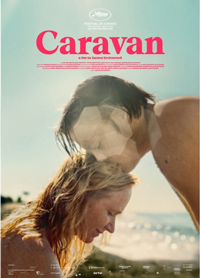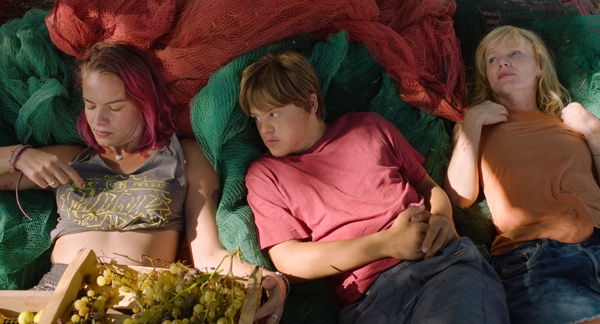All About My Martyr: Kirchnerová’s Debut Finds the Journey is the Destination
 For her directorial debut, “Caravan,” Czech director Zuzana Kirchnerová weaves autobiographical elements into a road trip narrative contending with transitional phases of life, and, moreover, motherhood. Buoyed by esteemed Czech actor Anna Geislerová, captivating in what may stand as one her most prominent performances, it’s an internalized relationship film about a woman running away from the inevitable, perhaps mistakenly by turning to relief from remnants of the past. Defined by her somewhat isolating role as a mother to a disabled child, her bond built on codependent emotional survival with her teenage son begins to crumble as both yearn for the independence life has denied them.
For her directorial debut, “Caravan,” Czech director Zuzana Kirchnerová weaves autobiographical elements into a road trip narrative contending with transitional phases of life, and, moreover, motherhood. Buoyed by esteemed Czech actor Anna Geislerová, captivating in what may stand as one her most prominent performances, it’s an internalized relationship film about a woman running away from the inevitable, perhaps mistakenly by turning to relief from remnants of the past. Defined by her somewhat isolating role as a mother to a disabled child, her bond built on codependent emotional survival with her teenage son begins to crumble as both yearn for the independence life has denied them.
What seems to be a much needed vacation for Ester (Geislerová) alongside an old friend in Italy descends into chaos when outbursts from her son David (David Vodstrčil) disrupts the camaraderie. David, who has Down syndrome, exhibits behaviors which alarm the sanguine normality of Ester’s friend and her young children, and she overhears them pitying her circumstances. David’s behavior relegates them to a garden caravan in the backyard, and the increasingly frazzled Ester decides to abscond in the vehicle, heading south after reminiscing about her own years as a young adult, when life seemed carefree and rife with possibility.
 While stopping at a gas station they bump into Zuza (Juliána Oľhová), a pink-haired rebel who shares a flirtatious energy with David and, as would luck would have it, needs a ride. Ester is moved by the camaraderie Zuza shares with both of them, and the trio end up in a series of random situations, including neon-lit rave and flirtations with vacationing young men. But Zuza’s presence also influences David’s budding sexuality, something his mother has tried to overlook, which, in turn, has forced her to sacrifice her own physical needs.
While stopping at a gas station they bump into Zuza (Juliána Oľhová), a pink-haired rebel who shares a flirtatious energy with David and, as would luck would have it, needs a ride. Ester is moved by the camaraderie Zuza shares with both of them, and the trio end up in a series of random situations, including neon-lit rave and flirtations with vacationing young men. But Zuza’s presence also influences David’s budding sexuality, something his mother has tried to overlook, which, in turn, has forced her to sacrifice her own physical needs.
As her funds become depleted, Ester ends up working for a man named Marco, who manages immigrant farm workers near where their caravan is camped. Having repressed previous opportunities for sexual relief, she at last finds an appropriate moment with Marco. But when Zuza suddenly leaves them and Marco doesn’t seem entirely excited about Ester having a disabled child in tow, Ester’s brief sense of peace dissipates once again.
In several respects, “Caravan,” plays like a Dardenne Bros. film, replete with an ironic title suggesting a destination or experience of respite, neither of which seem to be in reach for Ester and David. Their character names, also, conjure Biblical allusions to lionized counterparts who both risked themselves for a greater good. But DP Simona Weisslechner plays specifically with lighting and framing to suggest environmental cues as impactful on these characters, particularly David, who is non-verbal yet constantly communicating his interiority.

The film itself is largely an internalized narrative, and it’s the physicality shared by Geislerová and Vodstrčil which propels the film’s quiet but meaningful relationship driven meaning. Geislerová, who is as effervescent here as she was in Jan Hrebejk’s Beauty in Trouble (2006), a title which could relate to Ester as well, conjures frustration and empathy as a mother simply trying do the right thing by her child, but sacrificing herself to what could eventually be obliteration if nothing were to stop her. Zuza is the brief but perfect salvation for a mother and son who are reminded they can (and should) open themselves up to the world even when it’s not always comfortable.
Reviewed on May 22nd at the 2025 Cannes Film Festival (78th edition) – Un Certain Regard. 102 Mins.
★★★/☆☆☆☆☆


